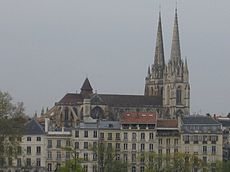Diocese of Bayonne
|
Diocese of Bayonne, Lescar, and Oloron Dioecesis Baionensis, Lascurrensis et Oloronensis
|
|
|---|---|

|
|
| Location | |
| Country | |
| Ecclesiastical province | Bordeaux |
| Metropolitan | Archdiocese of Bordeaux |
| Statistics | |
| Area | 7,644 km2 (2,951 sq mi) |
| Population - Total - Catholics |
(as of 2012) 669,300 570,000 (85.2%) |
| Parishes | 69 |
| Information | |
| Denomination | Roman Catholic |
| Sui iuris church | Latin Church |
| Rite | Roman Rite |
| Established | United: 22 June 1909 |
| Cathedral | Cathedral of Notre Dame in Bayonne |
| Patron saint | Blessed Virgin Mary Assumed in Heaven |
| Secular priests | 279 (diocesan) 123 (religious Orders) |
| Current leadership | |
| Pope | Francis |
| Bishop | Marc Aillet |
| Metropolitan Archbishop | Cardinal Jean-Pierre Ricard |
| Emeritus Bishops | Pierre Molères Bishop Emeritus (1986-2008) |
| Website | |
The Roman Catholic Diocese of Bayonne, Lescar, and Oloron, commonly Diocese of Bayonne (Latin: Dioecesis Baionensis, Lascurrensis et Oloronensis; French: Diocèse de Bayonne, Lescar et Oloron; Basque: Baionako, Leskarreko eta Oloroeko elizbarrutia) is a suffragan diocese of the Latin Rite of the Roman Catholic church in France in the ecclesiastical provinceof the Metropolitan Archdiocese of Bordeaux, in the administrative region Pyrénées-Atlantiques.
Its cathedral episcopal see is a World Heritage Site (Minor): Cathédrale Notre-Dame dedicated to Our Lady, in Bayonne. Elsewhere in Aquitaine, the bishopric has two former cathedrals, both also Marian :
The diocese comprises the Department of Pyrénées-Atlantiques, in the Region of Nouvelle-Aquitaine.
As of 2014, it pastorally served 574,900 Catholics (85.2% of 675,000 total) on 7,712 km² in 69 parishes with 392 priests (278 diocesan, 114 religious), 10 deacons, 570 lay religious (173 brothers, 397 sisters), 17 seminarians.
Established circa 400 as Diocese of Bayonne / Baionen(sis) (Latin adjective)
Local tradition maintains that St. Leo, the martyr, with whose memory is associated a miraculous fountain, was the first Bishop of Bayonne; but Leo was a priest of the third quarter of the ninth century, and his hagiographies insist that he had been Archbishop of Rouen before travelling to Bayonne. As Honoré Fisquet puts it succinctly, these lives have nothing really authentic in them.
...
Wikipedia
